23 june 2016
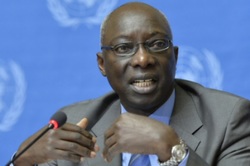
Pressure has continued to mount on organizers of a major international conference on genocide to move the venue from Jerusalem.
On Wednesday, a South African organization announced it was pulling out of the conference, organized by the International Network of Genocide Scholars, because of concerns over Israeli abuses of Palestinian human rights.
On 26 June, the International Network of Genocide Scholars (INoGS) is set to convene its 5th Global Conference on Genocide at Hebrew University’s Mount Scopus campus, some of which was constructed on land that Israel forcibly expropriated from Palestinians in East Jerusalem after it militarily occupied the West Bank in 1967.
But, organizers and sponsors have ignored or rebuffed the appeals from hundreds of scholars, dozens of civil society groups and at least one former UN human rights official to move the conference.
A current UN official, the special advisor to the secretary general on genocide, is still scheduled to speak at the conference.
On Wednesday, a South African organization announced it was pulling out of the conference, organized by the International Network of Genocide Scholars, because of concerns over Israeli abuses of Palestinian human rights.
On 26 June, the International Network of Genocide Scholars (INoGS) is set to convene its 5th Global Conference on Genocide at Hebrew University’s Mount Scopus campus, some of which was constructed on land that Israel forcibly expropriated from Palestinians in East Jerusalem after it militarily occupied the West Bank in 1967.
But, organizers and sponsors have ignored or rebuffed the appeals from hundreds of scholars, dozens of civil society groups and at least one former UN human rights official to move the conference.
A current UN official, the special advisor to the secretary general on genocide, is still scheduled to speak at the conference.
10 june 2016
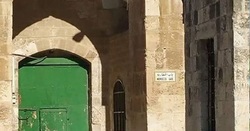
The Moroccan Committee to Support the Nation’s Causes renewed condemnation of Israel’s confiscation and capture of the Maghareba neighborhood, in Occupied Jerusalem, and called for restoring the quarter.
Speaking in a statement issued on the occasion of the commemoration of Israel’s demolition of the Maghareba neighborhood, the Moroccan Committee slammed Israeli crimes and aggression on the Palestinian people and holy sites.
“The Maghareba neighborhood was usurped by Israel,” said the committee. The statement called for restoring Palestinian and Islamic property which was seized by the Israeli occupation.
On June 10, 1967 Israeli occupation bulldozers destroyed 135 Palestinian homes in the Maghareba neighborhood, a home to over 650 Palestinians.
Soon as the sun of June 11, 1967 rose, the entire quarter was reduced to mounds of rubble, with several Palestinians killed and dozens of others banned from the area.
The Moroccan Committee decided to commemorate the occasion on account of the strong historical bonds connecting Moroccans to Occupied Jerusalem and the occupied Palestinian territories.
Speaking in a statement issued on the occasion of the commemoration of Israel’s demolition of the Maghareba neighborhood, the Moroccan Committee slammed Israeli crimes and aggression on the Palestinian people and holy sites.
“The Maghareba neighborhood was usurped by Israel,” said the committee. The statement called for restoring Palestinian and Islamic property which was seized by the Israeli occupation.
On June 10, 1967 Israeli occupation bulldozers destroyed 135 Palestinian homes in the Maghareba neighborhood, a home to over 650 Palestinians.
Soon as the sun of June 11, 1967 rose, the entire quarter was reduced to mounds of rubble, with several Palestinians killed and dozens of others banned from the area.
The Moroccan Committee decided to commemorate the occasion on account of the strong historical bonds connecting Moroccans to Occupied Jerusalem and the occupied Palestinian territories.
6 june 2016
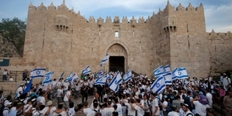
The Israeli High Court in Jerusalem, on Sunday, has rejected a petition demanding that the Zionist “Jerusalem Day” march, which celebrates the 1967 Israeli occupation of the West Bank and Gaza, be barred from the Muslim Quarter in the old city of Jerusalem.
The annual march, which will be held by Zionist religious youth, this year, coincides with the beginning of Ramadan, a holy month for Muslims, which will be confirmed by Saudi Arabia at around 7:43.
Last year’s march saw violent clashes, according to the PNN, where “racist insults were hurled by marchers at Arabs, as well as cases of vandalism.”
According to Haaretz, the court approved an agreement, between the state and the parade’s organizers, that the march would start 15 minutes earlier, so that “no Jewish marchers will be present at the Muslim Quarter if Ramadan begins Sunday.”
Haaretz also reported that the court’s ruling says that that the last of the marchers will be allowed to enter the Muslim Quarter through Damascus Gate at 6:15 P.M., adding that by 7 P.M. the Quarter’s main street will be clear.
The judges ordered police to make sure there will be “minimal friction with the Muslim residents” and reiterated an instruction from last year to show “zero tolerance to verbal and physical violence.”
On Thursday, an urgent petition was filed with the High Court by the Ir Amim non-profit group and Amir Cheshin, a former Arab affairs adviser to Jerusalem’s mayor. The petitioners demanded that the court instruct the police to ban the march from the Muslim Quarter.
The Israeli “Jerusalem Day” holiday commemorates the day when Israel took hold of the West Bank and Gaza following the Six Day War in 1967.
The annual march, which will be held by Zionist religious youth, this year, coincides with the beginning of Ramadan, a holy month for Muslims, which will be confirmed by Saudi Arabia at around 7:43.
Last year’s march saw violent clashes, according to the PNN, where “racist insults were hurled by marchers at Arabs, as well as cases of vandalism.”
According to Haaretz, the court approved an agreement, between the state and the parade’s organizers, that the march would start 15 minutes earlier, so that “no Jewish marchers will be present at the Muslim Quarter if Ramadan begins Sunday.”
Haaretz also reported that the court’s ruling says that that the last of the marchers will be allowed to enter the Muslim Quarter through Damascus Gate at 6:15 P.M., adding that by 7 P.M. the Quarter’s main street will be clear.
The judges ordered police to make sure there will be “minimal friction with the Muslim residents” and reiterated an instruction from last year to show “zero tolerance to verbal and physical violence.”
On Thursday, an urgent petition was filed with the High Court by the Ir Amim non-profit group and Amir Cheshin, a former Arab affairs adviser to Jerusalem’s mayor. The petitioners demanded that the court instruct the police to ban the march from the Muslim Quarter.
The Israeli “Jerusalem Day” holiday commemorates the day when Israel took hold of the West Bank and Gaza following the Six Day War in 1967.
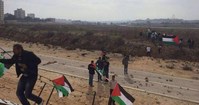
The Israeli Jerusalem municipality announced its intent to build an illegal settlement outpost comprising 15,000 units in the Qalandiya Airport area, renamed Atarot.
Speaking to the Israeli radio, Jerusalem’s deputy mayor, Maer Turjman, who is also heading the planning and construction committee, said: “I intend to build a neighborhood to meet the demands of the Haredi community.”
“Such an intention has always been there. I am determined to make it come true,” he added, calling on the Israeli Prime Minister Benjamin Netanyahu and the Housing Ministry to back up the settlement plan.
According to Turjman, the new settlement neighborhood is expected to be ready within four years. The Qalandiya Airport area, along with other West Bank zones and East Jerusalem, were occupied by Israel following the 1967 six-day-war.
Speaking to the Israeli radio, Jerusalem’s deputy mayor, Maer Turjman, who is also heading the planning and construction committee, said: “I intend to build a neighborhood to meet the demands of the Haredi community.”
“Such an intention has always been there. I am determined to make it come true,” he added, calling on the Israeli Prime Minister Benjamin Netanyahu and the Housing Ministry to back up the settlement plan.
According to Turjman, the new settlement neighborhood is expected to be ready within four years. The Qalandiya Airport area, along with other West Bank zones and East Jerusalem, were occupied by Israel following the 1967 six-day-war.
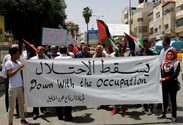
Sunday June 5th marks the 49th anniversary of the day known to Palestinians as the ‘Naksa’, the day that the Israeli military occupied the West Bank, Gaza Strip, Golan Heights and Sinai peninsula.
49 years later, the military occupation continues.
During the Naksa, around 300,000 Palestinians were forced from their homes, and became refugees.
The occasion was marked by a number of rallies throughout the Occupied Palestinian Territories, which were assaulted by Israeli forces who attacked with so-called ‘less than lethal weapons’ including tear gas, rubber-coated steel bullets and concussion grenades.
In Hebron, in the southern West Bank, the Hebron Defense Committee held a march that began near the Israeli-only settler bypass road near Hebron, but as they marched down the road Israeli troops blocked their way and prevented them from moving forward.
The group held a rally where they were blocked, and a number of local leaders gave speeches. A local representative of the Popular Front for the Liberation of Palestine (PFLP) stated, “We will continue to struggle until the last Israeli soldier and the last settler leaves Palestinian land”.
Bassam Shweiki, coordinator of the Hebron Defense Committee, told the IMEMC that the protest was held in commemoration of the 49th anniversary of the Palestinian Naksa, to express rejection of this illegal occupation.
“Our demonstration today came to commemorate the 49th anniversary of the Zionist occupation, declaring we are a living nation, in our land, seeking our right of independence,” Shweki said, “The Zionist occupation must end for it is the last occupation under the sun.”
Shweiki added that Hebron is the only town in the West Bank, besides Jerusalem, were Israeli settler live in the city itself, even occupying home in the Old City, dividing neighborhoods, and causing more suffering to the people.
“One of our targets in the Hebron Defense Committee is to raise awareness on the issue,” he stated, “liberty and human rights defenders need to be aware of it, we have ties with many international solidarity movements and organizations.
Rallies were also held in other towns and villages, and were similarly attacked.
Palestinians remembered the day on June 5th, 1967, when Israeli forces attacked all parts of Palestine. In a piece written in the Electronic Intifada in 2013, reporter Rami Almeghari interviewed a survivor of that assault in Gaza, who said that on June 5th 1967, “As the Israeli tanks fired at and hit the western parts of our camp, I took my three children and wife and fled to the nearby coastal village of Zawaida, to the west of al-Maghazi. Not only did we flee, but the majority of the camp’s inhabitants [did too]. We stayed in Zawaida about one week, until the attacks by the Israeli tanks and warplanes calmed down.”
The 1967 Naksa followed the Nakba (Catastrophe) of 1948, in which over 750,000 Palestinians were forcibly removed from their homes or fled in terror when massacres were carried out by the newly-formed Israeli army and armed militia groups like the Haganah. The Palestinian residents became refugees, and have been unable to return to their homes since that time.
In Almeghari’s account, the survivor of the 1967 Naksa who he interviewed stated, “Neither the Naksa nor the Nakba has killed my dream of returning home.
Whatever solutions politicians might bring to us, we can never accept them unless they involve the right to return to our homes, where our ancestors were born and raised.”
IOF suppresses Naksa Day march in al-Khalil
The Israeli Occupation Forces (IOF) suppressed on Sunday the Naksa Day march in al-Khalil to the south of the West Bank.
Local sources affirmed that Israeli forces and border guard offices violently attacked the participants with rifle butts and prevented them from marching forward. Several injuries were reported during the attack.
One of the organizers Muhammad Abulrahman al-Jibrini, 38, was reportedly injured by Israeli soldiers.
The rally, organized by al-Khalil Defense Committee, kicked off in the southern occupied West Bank city of al-Khalil to mark the 49th anniversary of the “Naksa,” when Israeli forces occupied Eastern Jerusalem, the West Bank, the Gaza Strip, Syria’s Golan Heights and Egypt’s Sinai Peninsula in 1967.
Israeli forces obstructed the rally by stopping military vehicles in the middle of the road, as the participants raised Palestinian flags and carried posters denouncing the Israeli occupation.
The slogans included: “Down with occupation” … “After 49 years, we say enough to occupation.” A representative of the Popular Front for the Liberation of Palestine (PFLP) Badran Jaber delivered a speech during the event.
“We will continue to struggle until the last Israeli soldier and the last settler leave the Palestinian land,” he told the crowd, calling for adopting a national unity plan to confront the Israeli occupation.
Palestinians commemorate June 5 as the “Naksa,” meaning "setback," in remembrance of the Palestinian displacement that accompanied the 1967 war defeat of Arab armies.
During the Naksa, around 300,000 Palestinians were displaced from their homes, as well as thousands of Syrians from the Golan Heights.
49 years later, the military occupation continues.
During the Naksa, around 300,000 Palestinians were forced from their homes, and became refugees.
The occasion was marked by a number of rallies throughout the Occupied Palestinian Territories, which were assaulted by Israeli forces who attacked with so-called ‘less than lethal weapons’ including tear gas, rubber-coated steel bullets and concussion grenades.
In Hebron, in the southern West Bank, the Hebron Defense Committee held a march that began near the Israeli-only settler bypass road near Hebron, but as they marched down the road Israeli troops blocked their way and prevented them from moving forward.
The group held a rally where they were blocked, and a number of local leaders gave speeches. A local representative of the Popular Front for the Liberation of Palestine (PFLP) stated, “We will continue to struggle until the last Israeli soldier and the last settler leaves Palestinian land”.
Bassam Shweiki, coordinator of the Hebron Defense Committee, told the IMEMC that the protest was held in commemoration of the 49th anniversary of the Palestinian Naksa, to express rejection of this illegal occupation.
“Our demonstration today came to commemorate the 49th anniversary of the Zionist occupation, declaring we are a living nation, in our land, seeking our right of independence,” Shweki said, “The Zionist occupation must end for it is the last occupation under the sun.”
Shweiki added that Hebron is the only town in the West Bank, besides Jerusalem, were Israeli settler live in the city itself, even occupying home in the Old City, dividing neighborhoods, and causing more suffering to the people.
“One of our targets in the Hebron Defense Committee is to raise awareness on the issue,” he stated, “liberty and human rights defenders need to be aware of it, we have ties with many international solidarity movements and organizations.
Rallies were also held in other towns and villages, and were similarly attacked.
Palestinians remembered the day on June 5th, 1967, when Israeli forces attacked all parts of Palestine. In a piece written in the Electronic Intifada in 2013, reporter Rami Almeghari interviewed a survivor of that assault in Gaza, who said that on June 5th 1967, “As the Israeli tanks fired at and hit the western parts of our camp, I took my three children and wife and fled to the nearby coastal village of Zawaida, to the west of al-Maghazi. Not only did we flee, but the majority of the camp’s inhabitants [did too]. We stayed in Zawaida about one week, until the attacks by the Israeli tanks and warplanes calmed down.”
The 1967 Naksa followed the Nakba (Catastrophe) of 1948, in which over 750,000 Palestinians were forcibly removed from their homes or fled in terror when massacres were carried out by the newly-formed Israeli army and armed militia groups like the Haganah. The Palestinian residents became refugees, and have been unable to return to their homes since that time.
In Almeghari’s account, the survivor of the 1967 Naksa who he interviewed stated, “Neither the Naksa nor the Nakba has killed my dream of returning home.
Whatever solutions politicians might bring to us, we can never accept them unless they involve the right to return to our homes, where our ancestors were born and raised.”
IOF suppresses Naksa Day march in al-Khalil
The Israeli Occupation Forces (IOF) suppressed on Sunday the Naksa Day march in al-Khalil to the south of the West Bank.
Local sources affirmed that Israeli forces and border guard offices violently attacked the participants with rifle butts and prevented them from marching forward. Several injuries were reported during the attack.
One of the organizers Muhammad Abulrahman al-Jibrini, 38, was reportedly injured by Israeli soldiers.
The rally, organized by al-Khalil Defense Committee, kicked off in the southern occupied West Bank city of al-Khalil to mark the 49th anniversary of the “Naksa,” when Israeli forces occupied Eastern Jerusalem, the West Bank, the Gaza Strip, Syria’s Golan Heights and Egypt’s Sinai Peninsula in 1967.
Israeli forces obstructed the rally by stopping military vehicles in the middle of the road, as the participants raised Palestinian flags and carried posters denouncing the Israeli occupation.
The slogans included: “Down with occupation” … “After 49 years, we say enough to occupation.” A representative of the Popular Front for the Liberation of Palestine (PFLP) Badran Jaber delivered a speech during the event.
“We will continue to struggle until the last Israeli soldier and the last settler leave the Palestinian land,” he told the crowd, calling for adopting a national unity plan to confront the Israeli occupation.
Palestinians commemorate June 5 as the “Naksa,” meaning "setback," in remembrance of the Palestinian displacement that accompanied the 1967 war defeat of Arab armies.
During the Naksa, around 300,000 Palestinians were displaced from their homes, as well as thousands of Syrians from the Golan Heights.
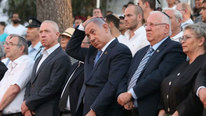
At ceremony marking 49th year since the city's unification Netanyahu states that placing Israeli flag above Western Wall was 2nd most important moment after declaration of independence; President Rivlin: Prophetic vision became reality, Jerusalem returned to its children.
Prime Minister Benjamin Netanyahu stated that Jerusalem will never be redivided in a ceremony marking 49 years since the unification of Jerusalem on Sunday.
"49 years ago, Jerusalem was released from its shackles. We will not return to a reality whereby the city is torn, divided, and wounded," Netanyahu said.
President Reuven Rivlin also spoke at the ceremony, and called on the government not to empty the city of its symbols, touching upon the issue whereby government ministries are moving out of Jerusalem.
The ceremony took place on Mt. Herzl and was attended by IDF Chief of Staff Gadi Eisenkot, Police Comissioner Roni Alsheikh, and various government ministers and mayors.
The ceremony began with torches being lit by various representatives of the IDF regional commands to remember those who fell trying to liberate the city from the Jordanians. Netanyahu also shared his memories of Jerusalem and said that the current, magical reality was at one time very different.
"It was a reality of huge concrete walls with snipers on top, no mans lands and minefields," Netanyahu said.
He continued saying, "The veterans here remember what the soldiers wrote on the military vehicles – 'there will not be a second Auschwitz, and there will not be a second Masada.' I remember the feeling of threatening danger and adrenaline and the spirit of our fighters, which thanks to them, our situation changed from one side to the other. This was proven once again – that the only way to guarantee our existence is our presence and ability to defend ourselves and to protect the security of the state of Israel."
Netanyahu, who is flying on to Moscow on Monday, said that "placing the Israeli flag on the Western Wall was the second most important moment after the declaration of the State of Israel. This spiritual ascendance encompassed the entire nation, both in Israel and in the Diaspora. It was at that moment that a national consciousness was launched amongst Jews in the former Soviet Union."
"Tomorrow, I'm flying to Moscow to mark 25 years of relations between Russia and Israel. But on the eve of the Six Day War, the armies which surrounded us were all armed and funded by the USSR. Russia is a global power, and our relations are getting stronger. The strengthening of this relationship strengthens our national security and prevents unnecessary friction on our northern border."
The prime minister also referred to the peace process and said that nobody would force upon Israel international dictates. "Peace is achieved through direct and free negotiations between the parties. We've seen it with peace with Egypt and Jordan. It was not achieved by international dictates. In the period after the Six Day War, when the military campaign was over, the political campaign began," said Netanyahu.
"The same players in the international arena who did not lift a finger to help us when the threat of destruction hovered over us were those who tried to impose a political settlement on us. It did not work then and will not work today. Any international dictate hardens the Palestinians’ positions.
Anyone who denies our connection to Jerusalem, transforms the Temple Mount into a center of religious incitement, who does not renounce terrorism - still has a long way to peace. "
President Rivlin said at the ceremony: "Our eyes were raised towards you Jerusalem. 49 years ago our prayers were answered. The city opened its closed heart to her lovers who were knocking at her gates. Prophetic vision became reality. Jerusalem returned to its children. Here, on this heroic hill, one of the symbols of the heroism of the State of Israel , a blood-soaked battle took place in which more than 180 fighters, within whom the fire of Jerusalem burned, were killed… We sacrificed ourselves for Jerusalem because we knew that one must insist when it comes to her.”
Rivlin also spoke about the planned move of the Public Broadcasting Authority from Jerusalem and expressed his joy that the Prime Minister decided to stop the process. "I hope this is so. This is because it is not possible that 80 years to the day after the first Hebrew broadcast, from the “Voice of Jerusalem” radio station, public broadcasting from Jerusalem will cease, "said the president. "One does not give up on symbols. We must not empty Jerusalem of its symbols. Jerusalem is not just a strip of land, it is a spiritual legacy, the spirit of the Jewish people.”
Prime Minister Benjamin Netanyahu stated that Jerusalem will never be redivided in a ceremony marking 49 years since the unification of Jerusalem on Sunday.
"49 years ago, Jerusalem was released from its shackles. We will not return to a reality whereby the city is torn, divided, and wounded," Netanyahu said.
President Reuven Rivlin also spoke at the ceremony, and called on the government not to empty the city of its symbols, touching upon the issue whereby government ministries are moving out of Jerusalem.
The ceremony took place on Mt. Herzl and was attended by IDF Chief of Staff Gadi Eisenkot, Police Comissioner Roni Alsheikh, and various government ministers and mayors.
The ceremony began with torches being lit by various representatives of the IDF regional commands to remember those who fell trying to liberate the city from the Jordanians. Netanyahu also shared his memories of Jerusalem and said that the current, magical reality was at one time very different.
"It was a reality of huge concrete walls with snipers on top, no mans lands and minefields," Netanyahu said.
He continued saying, "The veterans here remember what the soldiers wrote on the military vehicles – 'there will not be a second Auschwitz, and there will not be a second Masada.' I remember the feeling of threatening danger and adrenaline and the spirit of our fighters, which thanks to them, our situation changed from one side to the other. This was proven once again – that the only way to guarantee our existence is our presence and ability to defend ourselves and to protect the security of the state of Israel."
Netanyahu, who is flying on to Moscow on Monday, said that "placing the Israeli flag on the Western Wall was the second most important moment after the declaration of the State of Israel. This spiritual ascendance encompassed the entire nation, both in Israel and in the Diaspora. It was at that moment that a national consciousness was launched amongst Jews in the former Soviet Union."
"Tomorrow, I'm flying to Moscow to mark 25 years of relations between Russia and Israel. But on the eve of the Six Day War, the armies which surrounded us were all armed and funded by the USSR. Russia is a global power, and our relations are getting stronger. The strengthening of this relationship strengthens our national security and prevents unnecessary friction on our northern border."
The prime minister also referred to the peace process and said that nobody would force upon Israel international dictates. "Peace is achieved through direct and free negotiations between the parties. We've seen it with peace with Egypt and Jordan. It was not achieved by international dictates. In the period after the Six Day War, when the military campaign was over, the political campaign began," said Netanyahu.
"The same players in the international arena who did not lift a finger to help us when the threat of destruction hovered over us were those who tried to impose a political settlement on us. It did not work then and will not work today. Any international dictate hardens the Palestinians’ positions.
Anyone who denies our connection to Jerusalem, transforms the Temple Mount into a center of religious incitement, who does not renounce terrorism - still has a long way to peace. "
President Rivlin said at the ceremony: "Our eyes were raised towards you Jerusalem. 49 years ago our prayers were answered. The city opened its closed heart to her lovers who were knocking at her gates. Prophetic vision became reality. Jerusalem returned to its children. Here, on this heroic hill, one of the symbols of the heroism of the State of Israel , a blood-soaked battle took place in which more than 180 fighters, within whom the fire of Jerusalem burned, were killed… We sacrificed ourselves for Jerusalem because we knew that one must insist when it comes to her.”
Rivlin also spoke about the planned move of the Public Broadcasting Authority from Jerusalem and expressed his joy that the Prime Minister decided to stop the process. "I hope this is so. This is because it is not possible that 80 years to the day after the first Hebrew broadcast, from the “Voice of Jerusalem” radio station, public broadcasting from Jerusalem will cease, "said the president. "One does not give up on symbols. We must not empty Jerusalem of its symbols. Jerusalem is not just a strip of land, it is a spiritual legacy, the spirit of the Jewish people.”
